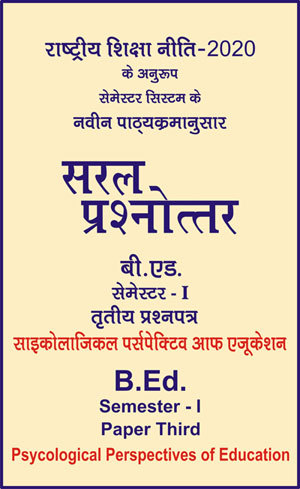|
बी एड - एम एड >> बी.एड. सेमेस्टर-1 प्रश्नपत्र-III - साइकोलाजिकल पर्सपेक्टिव आफ एजूकेशन बी.एड. सेमेस्टर-1 प्रश्नपत्र-III - साइकोलाजिकल पर्सपेक्टिव आफ एजूकेशनसरल प्रश्नोत्तर समूह
|
5 पाठक हैं |
|||||||
बी.एड. सेमेस्टर-1 प्रश्नपत्र-III - साइकोलाजिकल पर्सपेक्टिव आफ एजूकेशन (अंग्रेजी भाषा में)
Chapter 5 - Transfer of Learning
Question- State the meaning of transfer of learning and explain its principles.
Or
State the kind of transfer of learning.
Answer-
Meaning of Transfer of Learning
Transfer of learning use the learned verb or subject in other situations. That is, the effect of the knowledge acquired in the subject or situation on the acquisition of knowledge of other subjects is called transfer of learning. Thus we can say that the transfer of learning is the application of the knowledge acquired in one situation to another. Such as the knowledge gained from the learning of mathematics, physics, chemistry help in learning the other subjects. Scholars have tried to define transfer of learning in this way :
According to Crow & Crow : “Transfer of training is the use of knowledge or working habits acquired in the area of learning, experience or skill in another area of the learning.”
According to Callsanic : “Transfer is the use of actions acquired in the first situation skill, habits, abilities etc, in the second situation.”
According to Peterson : “Transfer is generalization because it allows ideas to reach a new area.”
It is clear from the above definitions that the transfer of learning is the application of previously learned acquired knowledge, skill, habit or other responses to another situation.
Types of Learning Transfer
There are two types of learning transfer :
(1) Affirmative / Positive Transfer : When previously acquired knowledge, skill, experience or training helps to learn a new task or information, it is called positive transfer. Ex. - The knowledge of driving car is helpful in learning to drive a truck and a person who knows how to drive a car, he can learn to drive a truck more easier than others.
(2) Negative Transfer : When the previously acquired knowledge, skill, training, experience hinder the learning of a new task or new information, it is called negative transfer. Ex. - Studying science subject by a commerce student.
Principles of Learning Transfer
Following are the principles of learning transfer :
(1) Theory of Mind Powers - This theory is based on power psychology. The proponents of this theory believed that the individual’s mind was made up of various forces. These powers are observation, memory, imagination, reasoning, judgement etc. and these powers do not meet each other and work independently. These powers are created by training them through practice. Then they can be used them efficiently under any circumstances. For example, if we want to train the memory power than it is also necessary to remember those words which the person does not need at that time. So the proponents of this theory mean that reasoning can be trained by mathematics. Then it helps to learn subject that requires reasoning.
(2) Principle of Equality : This theory was propounded by Thorndike. According to this theory, the more similar the experiences of two types of situations, the more they help each other to learn study and learn if there is any kind of disparity between the two subject, it is not helpful in learning each other in any way. Ex. - Knowledge of chemistry is not helpful in any way if there in studying of political science and its economies. Explaining this fact, Crow and Crow said that according to the principle of similar elements, the transfer of teams, from one position to another takes place in the same proportion which in the content, approach, method or objectives of both the situations are similar.
(3) Theory of Generalization : This theory was propounded by Charles Zah. According to him, one first derives a general theory through his own experience, study or knowledge then one can transfer that principle to other circumstances. Making this principle even more clear, he wrote in his book Educational psychology that when a learner understands the general theory related to a subject of science, than the learner develops the ability to transfer that training to other situations.
(4) Theory of G. and S. Factor : This theory was propounded by Spearman. According to him, to learn every subject both general and specific abilities are required in the child. He says that general / equal ability or intelligence is used on doing every task of a person life, but special ability or intelligence is used only in special circumstances.
|
|||||














